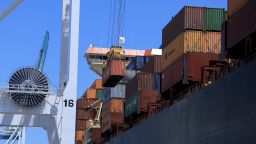Procter & Gamble said Thursday it would cut 7,000 jobs or about 6% of its total workforce over the next two years, as part of a new restructuring plan to counter uneven consumer demand and higher costs due to tariff uncertainty.
The world’s largest consumer goods company also plans to exit some product categories and brands in certain markets, executives said at a Deutsche Bank Consumer Conference in Paris.
The company had about 108,000 employees as of June 30, 2024. It said the job cuts would account for roughly 15% of its non-manufacturing workforce.

Related article How Trump’s tariffs and other policies are ‘raising hell,’ according to business owners
The Pampers maker’s two-year restructuring plan comes as consumer spending is expected to remain pressured this year and global consumer goods makers including P&G and Unilever brace for a further hit to demand from even higher prices.
“This is not a new approach, rather an intentional acceleration of the current strategy… to win in the increasingly challenging environment in which we compete,” executives said.
President Donald Trump’s sweeping tariffs on trading partners have roiled global markets and led to fears of a recession in the United States, the biggest market for P&G. The company imports raw ingredients, packaging materials and some finished products into the US from China.
Trump’s trade war has cost companies more than $34 billion in lost sales and higher costs, a Reuters analysis showed, a toll that is expected to rise.
In April, the Tide detergent maker said it would raise prices on some products and that it was prepared to pull every lever in its arsenal to mitigate the impact of tariffs.
Pricing and cost cuts were the main levers, CFO Andre Schulten said at the time.
On Thursday, Schulten and P&G’s operations head Shailesh Jejurikar said the geopolitical environment was “unpredictable” and that consumers were facing “greater uncertainty.”